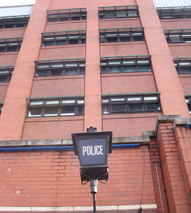A way to record incidents when police in England and Wales have used force is urgently needed to identify concerns and improve public confidence, the Independent Police Complaints Commission (IPCC) has said.
The IPCC’s Police Use of Force study brings together evidence from complaints and investigations as well as examining public perceptions. The research looked at the use of firearms, Taser and restraint techniques, among other types of force.
The report found the public believe police now use force more readily than a decade ago, and also believe that police use firearms much more often than they actually do.
IPCC chair Dame Anne Owers said: “People understand and expect that our police officers should have the power to use force when it is necessary to protect the public. However, officers must be accountable for their use of force, particularly when it leads to death or serious injury. Partly, this is done through investigations of serious incidents but a significant part of accountability is ensuring that the police consistently collect, analyse and publish data about how and when force is used. This allows areas of concern to be identified. It can also improve public confidence, by providing factual information to communities.
“The report raises particular concerns about the use of force on those with mental health concerns, who are particularly vulnerable but may also present challenges and risks to themselves and others. Not only do police need training in recognising and communicating with people in mental health crisis, but there is an urgent need to invest in appropriate mental health services to prevent such crises or manage people through them.”
For the full 105-page report visit http://www.ipcc.gov.uk/sites/default/files/Documents/IPCC_Use_Of_Force_Report.pdf.
More on mental health
The IPCC recommended that all police forces review existing arrangements relating to police attendance and their role at hospitals, mental health units or other medical settings, to minimise the involvement of the police.
Of incidents the IPCC investigated, half took place between 9pm and 3am, when (as the police complaints body pointed out) other support services are likely to be stretched or unavailable. Most of the incidents (61pc) happened in a public space, mostly in the street. Other public locations included a car park, inside and outside a licensed bar, in a hospital or at a bus or train station.
Ten people experienced police use of force while in a hospital – for example, in accident and emergency or a specialist mental health unit. There were some common features: involving people who were under the influence of drugs and/or alcohol, had mental health concerns, were behaving in an aggressive manner, or who had been subject to restraint.
Nine people were physically held by the police including four in the prone (face-down) position; CS spray/PAVA was used on two people; one person had Taser used on them (barbs); and restraint equipment was used on four people (two leg restraints, one emergency response belt, and one contamination hood). Other types of force included taking the person to the ground, pushing and pulling, and use of handcuffs. Medical staff and hospital security were also involved in four incidents. Five people died during or following the incident of force.
Comment
For the NPCC (National Police Chiefs’ Council), Lead for Conflict Management, Chief Constable David Shaw said: “This report adds to the body of knowledge into this very important aspect of policing. How, when and where police use force lies rights at the heart of legitimacy, public trust and policing by consent.
“There are some very positive findings in the report, however, I recognise there is important work to do to collect and analyse data on use of force so policing can learn from the results and information is publicly available. The review of the use of force that I am conducting is aimed at addressing these issues.
“I will now consider the report carefully and look forward to working with the IPCC as the review progresses.”










